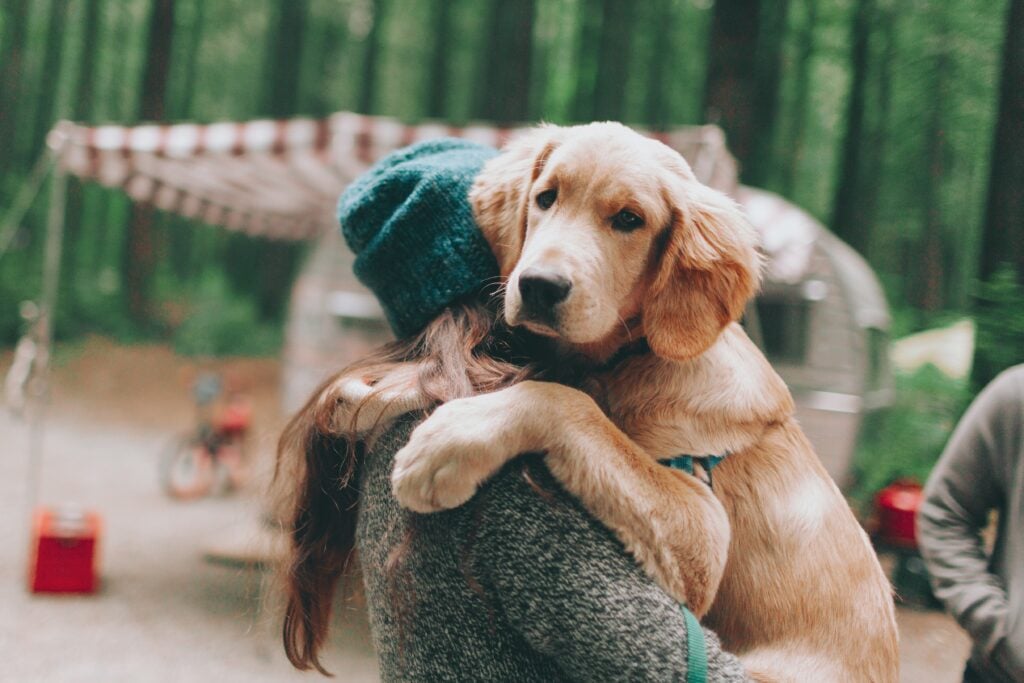Full-time RVing is a dream come true for many these days. The freedom to travel where and when you wish is enticing, even if you have to work along the way. But what about your trusty sidekick? Can they come along on this ever-changing adventure-turned-lifestyle? What about their fenced-in yard or daily walks at the local park? How will they adapt to a different location almost every day? To answer these questions and more, let’s take an inside look at what RVing with dogs is really like.
Is It Possible to Go Full-Time RVing With Dogs?
As a part of the family, canines can be an essential companion on the road. Solo travelers find their pooches help fill a void of loneliness. And families find that traveling with their pets can instill a sense of responsibility in their children. And let’s not ignore the fact that exploring new destinations can be stimulating for your dog, as well.
From a dog’s point of view, full-time travel can be a little overwhelming at first. Taking a walk in a different town each day or not having a consistent schedule can be a lot for a dog. But once they know what you expect of them, your dog can enjoy exciting new excursions.
That’s why so many RVers find a way to take their dog along when they hit the road full-time. In some cases, it may require some sacrifice or adaptation in terms of living quarters and travel schedules. And it certainly takes some forethought and planning. But most travelers discover that they wouldn’t have it any other way.

Helpful Tips for Full-Time RVing With Dogs
We’ve got several suggestions on how to make your full-time travel more inclusive of your dog. Let’s check them out below.
Pack Everything Your Dogs Would Normally Need
Before ever heading out, be sure to put together all of the necessary pet accessories and staples that your dog uses daily. These should include their preferred food, along with water and food bowls, a comfy bed that fits into your RV floor plan, and their favorite toys.
Along with everyday needs, pack extra towels for cleanup and unplanned dog baths and treats and distractions to help your dog adapt to road life easily. Leashes, collars, and doggie waste bags are required equipment at any campground and don’t take up much space. Also, bring along any equipment you use for training and obedience coaching.

Invest in Safety Gear When RVing With Dogs
When planning for your dog to accompany you, think about their safety. Don’t leave home until your pet has been microchipped and properly tagged. This added protection will give you peace of mind if your pooch ever gets away from you as you travel. Be sure to include a doggie first aid kit and a pet first-aid app for your phone.
You should also digitize your dog’s veterinary records and add them to an app or upload them to DropBox so they’re available anywhere. You never know when you might need to visit a vet in a new location. Ask each new doctor to send you the dog’s new notes via email so you can keep a growing file on your phone.
Never Leave Your Dogs in a Travel Trailer or Fifth Wheel While Traveling
If you have a vocal pet or one who suffers from separation anxiety, don’t leave them alone. No one goes camping for the experience of listening to a dog constantly bark or cry for their owner. Many campgrounds will ask you to leave if this is a constant occurrence.
Try training your pet before you become a full-time traveler to avoid problems. Practice leaving your dog for five or 10 minutes, giving them a treat when you leave. This may not be a fail-proof remedy for hardcore anxiety sufferers, but it can help. If you start this practice when your dog is a puppy, they might even learn to look forward to your departures.
For pets that just like to bark, take away their stimulus. Close the curtains, so they won’t see who or what is walking by. Turn on a radio or television to produce noise, so they aren’t tempted to bark at sounds they hear outside. Crate them so they can’t get into trouble while you’re away. And if necessary, use a bark collar with vibrations and noise that teach your dog behaviors that are unacceptable.
Stay at Pet-Friendly Campgrounds
Some campgrounds aren’t fond of pets. But many cater to your best buddy. When planning your camping trips, check campground websites or call to see if dog parks are available in the campground or nearby. Ask about specific rules relating to pets. You might be surprised to discover private campgrounds that provide everything from special “check-in treats” to dog baths, off-leash areas, and dog-friendly trails.

Pay Attention to Changing Temperatures
Many campers decide to start RVing so their pets can have a safe place to stay while their humans are out exploring. Most national parks, for instance, have a strict policy against dogs on many of their hiking trails and in public buildings. An RV can provide a temperature-controlled living area for your dog to wait for you to return from that ranger-led tour or lunch in a restaurant.
Many RVers depend on pet monitoring software or apps to know when to turn on the AC or heat for their pets. Some utilize cameras. A thermometer can tell you via a phone app when the RV’s temperature is getting too hot or cold, so you can respond accordingly. An internet connection or cell signal is usually required, but it’s a small action that will assure you that your dog is comfortable and safe.
Take Your Dogs on Frequent Walks When RVing Full-Time
Because they live in a much smaller space than your suburban home or even urban apartment, when you’re RVing with dogs, you do need to provide them with frequent exercise. Walks, visits to a local dog park, hikes, and time spent just sniffing the local scenery are all necessary. Planning dog activities each day will assure better behavior, and a tired pup come bedtime.

Keep Your Dogs Leashed Outside
Most campgrounds require that your pets are fully vaccinated and leashed whenever they’re outside your camper. Many proud dog owners brag that their canine is “on vocal command” or “won’t hurt anyone,” ignoring leash requirements. But the best-behaved dog still might chase after wildlife, other dogs, or people.
Private campgrounds have liability issues with pets that aren’t under their owners’ control. Don’t put them in an unenviable position by breaking this hard and fast rule. Otherwise, you’ll most likely lose your campsite and could end up with legal action if your dog’s natural reaction causes harm to humans or animals.
Don’t Allow Your Dogs to Bark Constantly at Campgrounds
Dogs that incessantly bark are an irritant that most campers and campground owners won’t endure for long. Don’t be that guy who leaves his dog in the RV to bark the entire time he’s away from the site. It’s frustrating for other campers who just came to the campground for some peace and quiet. Be courteous and train your pet to be courteous as well.
Always Clean up Waste When RVing With Dogs
Just as new parents are responsible for their children’s messy diapers and potty training, pet owners must be accountable for their dogs’ waste. There’s never a good reason to walk your dog without a doggie waste bag ready and waiting, even in your own neighborhood. If you can’t pick up after them immediately, you have no business owning a dog. And almost all campgrounds will ask you to leave if you can’t prove that you’re a good pet parent.
And by all means, dispose of waste in the appropriate trash cans. Don’t put poop bags in campsite bathroom trash cans or by picnic tables. Follow these few simple rules to have dogs that will be welcome at any campground.

Watch Out for Interactions With Wild Animals
One of the biggest reasons national parks don’t allow dogs on trails is possible confrontations with the resident wildlife. So while on your travels, be sure your pup is leashed, and keep an eye out for deer, moose, rattlesnakes, turtles, or raccoons. You don’t want your dog to have an unfortunate run-in with the local wildlife.
Full-Time RVing With Dogs Is Rewarding
When weighing the pros and cons of RVing with dogs, most full-time RVers can’t imagine their travels without their dog along for the ride. In fact, with a few adjustments for their safety and caretaking, you’ll find a willing, and ready travel partner that will require only a few extra treats and belly rubs in exchange for a lifetime of companionship on the road.

Leave a Reply